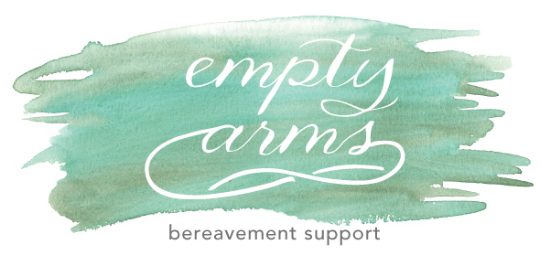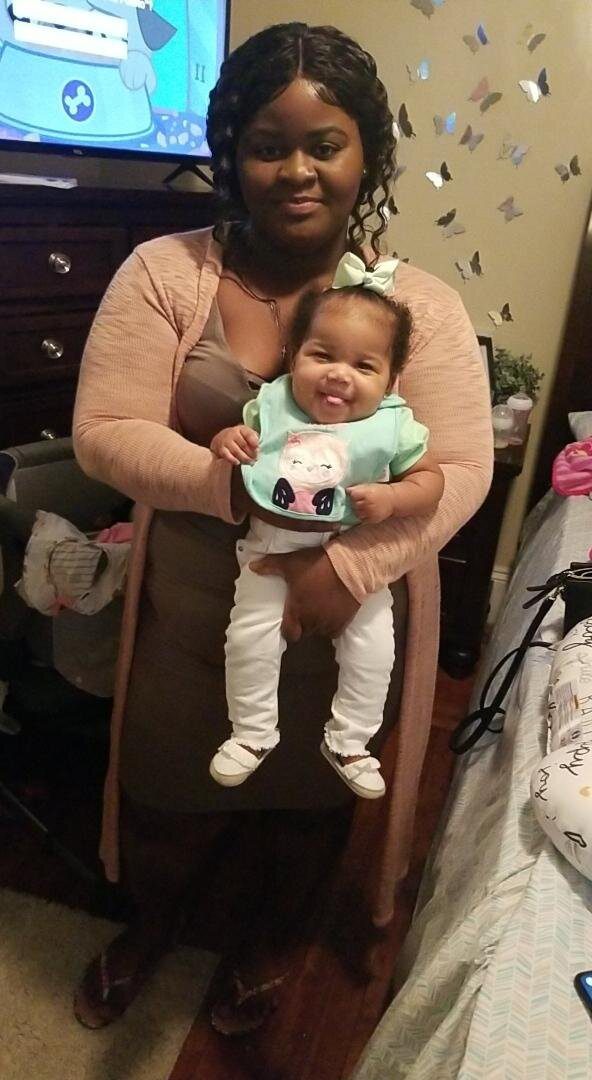Empty Arms offers more than bedside support: we become a trusted community resource and a reliable source of help. One time, we even saved a mother’s life. This is the story of one mother and two baby girls, and it is one I will never forget.
Renee arrived in Western Mass from Jamaica to work at Six Flags in the late spring of 2018, not knowing she was pregnant. Instead of finishing out the season and returning home to Jamaica to give birth to her baby, Renee went into premature labor at 23 weeks gestation and delivered her daughter in mid-September. This tiny girl fought a royal fight, clinging to life for 16 days in the NICU. Renee was by her side constantly, keeping vigil, hoping beyond all hopes that her tiny daughter would survive.
Renovian was the first living baby I ever had the honor of meeting as an Empty Arms Peer Companion. Renovian was like a living doll: she weighed only 1 pound, 4 ounces. I met Renee the day before Renovian died. The doctors had seen signs of Renovian’s tiny body failing for several days, and they could see that the end was inevitable. Knowing that Renee had no family support, they asked us to come and sit with her to talk through some end-of-life options. Early on the morning of September 26th, Empty Arms arrived at the NICU to sit with Renee and Renovian for several hours. I could not take my eyes off this baby. She was so, unimaginably tiny, but so vivacious. Her tiny hands waved around and she swatted at the lines and tubes that connected her to life sustaining machines. Her tiny head turned and her deep brown eyes opened and closed. It was, right before my eyes, the miracle of life and science and technology unfolding.
But all those advances of science could not save this baby. The next morning I received a text from Renee saying, “She died just now”. My heart broke for the two of them, this tiny, invisible family unit, so far from home. I went to the hospital and held her hand, and Empty Arms was able to help Renee to get some mementos of her sweet little daughter.
What greater privilege is there to meet someone who is here for such a brief time? What greater privilege is there to be invited into the last moments of a baby’s life, and then to sit with that baby and her mother and carefully capture moments so that she can somehow stay in that mother’s heart and memory forever?
For the first several weeks after Renovian died, Renee was allowed to continue to live in the Ronald McDonald house, where she had been staying during Renovian’s hospitalization. However, she had lost her apartment when she left work and now had nowhere to go. As the months went by, Renee and I stayed in touch. She spent time visiting cousins in New York City, Georgia and Florida, and as she grieved and tried to determine what to do next, I was on the other end of the phone, helping her to understand that her deep feelings of obsessive longing for Renovian were normal grief feelings and creating connections over the phone. There is a universality to grief and it is striking. I had been a married, white, settled middle class homeowner when my first daughter died, and she was a single, black, immigrant who was roaming the country with no permanent residence — yet we spoke the same language when it came to our daughters and our grief. I was starkly aware, however, of the advantages I held compared to her in our life experiences. Little did I know how that would play out in the year to come.
After about a year of intermittent communication our texts together died down. This is common– people often lean on their companions heavily in the beginning, and then establish other sources of reliable support within their own communities. I thought of Renee often, and of Renovian– after all, she was the only baby I’d ever seen alive. And so it was with incredible joy last June, during the first few months of the COVID pandemic that I received a text from Renee that came along with a photo of herself with a brand new baby girl: Re’niya had been born June 12th, but the announcement came with a terrifying next text: “Question: do you know how I can get help? I need to go to the ER but they won’t take me with the baby. My heart hurts. My feet are swollen and my heart aches. I went to the hospital but they refused to let me enter because I have the baby”.
I immediately recognized the signs of severe postpartum hypertension. If left untreated, this condition can be fatal, and from what Renee went on to describe to me, I recognized that she was in a very dangerous place. What she was experiencing was quite literally a direct path to her own death. She was single, alone and with a 10 day old newborn. She had only returned to Western Massachusettsrecently and she quite literally did not have anyone who could take her baby for her. Hospital policies across the region had strict policies in place prohibiting anyone other than the patient from entering the hospital. She didn’t know what to do.
Renee explained that when she had presented at her doctor’s office only a few days after Re’niya was born by c-section, they assessed her symptoms and told her to go right to the hospital. However, when she arrived there, having spent the money on an Uber to get there quickly, the hospital turned her away because she had her baby with her. At that point, she says, “I felt like I couldn’t breathe. My heart would skip a beat at times and it hurt so bad”. She was sent home, which with no viable alternative, she did. Several days later, her symptoms worstened and so she went again, thinking that as things were worse, they couldn’t refuse her this time. Yet once again she was denied entry because of her baby. How was she going to save herself?
A few days after that, she developed a severe, unrelenting headache. She says, “I had a crazy headache, heartache and crazy heart pain.” She called 911, described her situation, and the ambulance arrived. However, despite a blood pressure reading over 200, Renee was not allowed to bring her baby into the ambulance. Unable to leave the newborn alone, Renee– who was quite literally dying– had to sign paperwork indicating that she had “refused care”.
These words make my blood boil. Renee did not refuse care— these words are categorically untrue. Renee was refused care by our system, which did not have a space in it for under resourced new mothers like herself. What was she to do?
I picture Renee, asking herself, who is someone I can trust? Who is someone who is well resourced and can get me to where I can get the care I need? That is when she texted Empty Arms– specifically, me. It was 10 pm on a warm summer night, and I happened to glance at my phone on my way to bed. Immediately, alarm bells started going off in my head: this woman quite literally might not make it till morning. We had to get her into the hospital IMMEDIATELY.
My first thought was, I will go and watch the baby. I’ll drive forty-five minutes to where she lives, throw them in the car, get her to an ER and I’ll keep the baby. But then I thought better of it: what kind of a healthcare system separates a 10 day old baby from her mother? What kind of a healthcare system does not re-admit mothers who are experiencing postpartum complications? In addition, as a loss mom myself, I did not want to separate this mother from her baby, knowing how traumatic this might be for her. So I decided to do a bit of work before I rushed in.
Thankfully, Renee was right: due to my work at Empty Arms I am well resourced, and at my fingertips I had the number of an OB/GYN who worked at Renee’s local hospital. Crossing my fingers that she’d still be awake at this late hour, I sent her a text, explained the situation, and asked: could she help?
And she did. She helped immediately and completely. Within the hour, a plan was in place: Renee was to call her OB, ask for the doctor on call, and report her symptoms. Our Empty Arms advocate had herself just spoken to that doctor on call and had explained the severity of the situation. As soon as Renee called, she was instructed to come to the Emergency room and was told that a doctor from the obstetrical floor would meet her there and escort her and Re’niya up to be admitted.
Thank goodness they did. When they arrived, Renee’s condition was grave. Her heart had been hurting for a reason: she was in stage 3 hypertension. Her heart was working way too hard to supply blood to her body. She was in immediate danger of stroke, heart failure, and kidney failure. She was immediately placed on an IV and given the right medications to help to begin to lower her blood pressure. The first medication she was given caused her heart to race and she coded. Her lungs had fluid in them. Renee, a young black mother, was in extreme danger of fulfilling the terrifying prophecy that threatens every black mother in America. She might not make it out of this alive.
But she did. Somehow, her body rallied, and today she is alive and well. Nearly five months later, I quite honestly think of this near miss almost every day. Renee and I still text often. She is healthy, she has a job, and Re’niya is thriving. She and I have open conversations about the unfairness of this world and how she bears the burden of that system. We talk about how close she came and how grateful we both are that we knew each other and we could get her what she needed. She told me, “Thanks to you I’m here today with Re’niya– I just want to thank you so much for helping me when you did.”
Renee was exactly the type of person that our healthcare system misses. She is a young black mother, under-resourced and single. Our healthcare system is not set up to accommodate her, yet because of Empty Arms, Renee had someone to call. We were able to network her, and it made me feel like we had accomplished so much as a reliable resource to know that when Renee did the thinking of “who can I trust?” we were the ones who came to mind.
Yet, relief is far from my primary emotion when I recall this situation. It is outrageous and unfair that Renee was not admitted without question when she was clearly dying; it is outrageous and unfair that any medical professional did not immediately bend the rules to save her young life. There is so much work that our society needs to do to make certain that every person who needs health care can access it. There is so much work we need to do around caring for young mothers who may not have the resources they need to fit into the protocols that hospitals set. And of course, there is much work to do around the racism that persists in our culture and may have played a role in Renee’s horrifying experience. Yet in the midst of the undeniable reality that we live in a world where that is possible for women like Renee, I am grateful that we could help.

